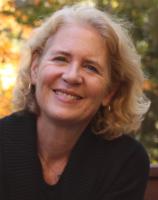Excerpt
Excerpt
A Perfect Arrangement

Part One
"She sounded cheery but earnest," Mirella told Howard that morning as she pressed a paper towel into a puddle of milk on Pearl's place mat.
"Cheery," said Howard, angled over the newspaper.
Mirella sat back and dried her fingers on her napkin. "A homey sort of voice." She looked at her watch, then checked the old walnut case clock by the fireplace, which as usual was slow. It was one of those sulfurous New England spring mornings that had been forecast to be mild but felt clammy instead, and as Mirella glanced from the clock to the window she found herself shivering.
"Comforting somehow," she said.
The Cook-Goldmans had been hunting for three weeks for a nanny to replace thick-chinned Grete, their second au pair in two years, who had flown home to Uppsala because she missed her boyfriend, Karl. There had been recent letters, sky-blue aerogrammes covered with Karl's blocky print. A midnight phone call, ending in assertive tears. "Karl needs me," Grete had said, her voice tremulous with complacency.
They were trying a new child-care agency this time, Family Options Ltd., which specialized in midwestern girls with teaching aspirations. "Could you be comfortable with anything but the best for your family?" queried Family Options' salmon-colored brochure. "Our nannies are dedicated, trained, and sensitive individuals, subject to rigorous screening and psychological evaluation. Guaranteed nationwide FBI criminal fingerprinting and background checks. Drug testing and CPR certification."
So far Mirella had not been impressed by the applicants from Family Options. It took two weeks for the agency to produce anyone for an interview-there was a waiting list of families desperate for a nanny, all the agencies said the same-then when Mirella asked the first applicant, a plump brunette from New Jersey, why she enjoyed working with children, the young woman burst into tears and confessed to having an eating disorder. The second, a former nursery school aide, a thin exhausted-looking person in a black straw hat, tripped over the doorstep when she arrived for her interview, then asked Mirella how much she had paid for her house.
"Always worry about the cheerful ones." Howard scanned the front page of the paper while snapping Jacob into his overalls. Rain predicted, Mirella read, craning sideways to look at the paper, today and tomorrow. The value of the Japanese yen had plummeted. Independent counsel widens presidential investigation. A shooting at an elementary school outside of Spokane. Jacob flapped his arms, his Indian headdress slipping over one eye. "Blud-a-bub," he said. Then he grunted and went limp in Howard's lap.
Mirella found the lid to the jelly jar and screwed it on. "She's been working for a family in Brookline and she used to run some kind of Sunday school program at a church."
"Sit up," Howard told Jacob.
Mirella took a sip of milky coffee, pausing to watch Jacob flutter his eyelashes. Blink, blink, pause. Blink, blink. A white crust of milk glazed his chin; an amber nugget of snot lodged in one nostril. Of course she worried. Only a year since that Boston nanny sat in the news day after day, face blank as a dinner roll, beside all those pictures of the poor little boy. Six months before, a mother at Pearl's preschool came home to find their nanny drunk in the TV room, the one-year-old asleep upstairs on the changing table. People were installing video recorders now. Worry didn't come near it.
Mirella cupped her palms to either side of her face and, for the countless time in the last few weeks, considered what would happen if she forgot about hiring a nanny for Pearl and Jacob, quit work, and stayed home. It could be nice, she thought. Block castles, Play-Doh birthday cakes, afternoons at the park. Immediately a Sahara of days spread across the table, burying the castles and birthday cakes, becoming a quicksand of dirty cups and dishes, hours draining into the laundry basket, trips to the park that took so long to prepare for that by the time everyone was ready, no one wanted to go. Back once more to their own yard-that grainy relief and reluctance as she struggled through the front door and into the hall, loaded like a camel with child, bags, dog leash, stroller. Home again, and again. The cloistered smell of the house becoming her own smell: cold coffee, a diaper left in the wastebasket, the glum reek of last night's fish clinging to the broiling pan left in the sink.
She squinted at the finish on the table, stippled with faint gashes wherever the children had drummed their forks and spoons, then looked at her watch again, calculating that she would have an hour to get downtown after dropping off Pearl at preschool. Five minutes to get from her car to the courthouse. Then two meetings after her hearing, tomorrow's deposition to prepare for, Hayman's restraining order to file, a phone conference at three.
Thank God, she thought.
Jacob had stuck his finger in the butter and was smudging his finger along the table; she reached over and wiped his hand with her napkin, then wiped his nose. "Mmff," he said, twisting his face away.
Because the law, unlike her family, was beautifully reducible. The law was simply a set of rules by which human beings governed themselves. That these rules could be complex, sometimes arcane, and-because they were formed out of language-forever open to reinterpretation, accounted for most of their scope and all of their interest. But what Mirella found moving, what had inspired her to become a lawyer in the first place, was the plain human need behind all lawmaking, the desire for guidance and precedent that went straight to a zone that was humanity itself, that might even, she sometimes suspected, be the deepest of all human passions.
Not that she had a chance to reflect on the essential purpose of law very often. Her clients, mostly women, were afraid of laws, which they regarded as punitive; they became restless and embarrassed, swiveling on their padded red conference chairs, fiddling with their earrings whenever she tried to discuss philosophical aspects of the legal system. And who could blame them? Usually the people who hired her were either terrified or confused, people who had disappointed other people, often without knowing quite how-abandoned wives, assaulted girlfriends, fired employees. They wanted clear satisfactions: money, vindication. Sometimes they wanted revenge, sometimes protection. Mostly they wanted Mirella to give them whatever it was they needed, as quickly as possible.
Jacob stuck his finger again in the butter dish. She reached over and gently pushed the butter dish across the table.
Howard was still reading the paper over the top of Jacob's head. "What's her name?"
Mirella shifted in her chair. "Sandy. We said ten. Apparently she likes doing crafts. And the woman at the agency said she loves to cook-"
"She probably has no legs or something."
Blinking herself now, Mirella let the rest of her sentence vanish into the complicated Italian design on her coffee mug.
"I didn't mean that about the no legs," he said.
Which was only his way, she recognized, a fraction too late, of trying to control what she'd arranged, this interview. Though Howard pretended not to believe in bargaining with fate, he did it all the time. Bargaining, as she well knew, forgiving him already, was what a worried person did to stop worrying. At least for a little while.
"Crafts," said Howard musingly.
Mirella put down her cup and looked at the dining room's wide brick fireplace, which was crammed with stuffed animals and a pair of beach towels. "So do you think you could tidy up a little before she gets here? Just the downstairs. I don't want her to think we're a bunch of cave dwellers."
"Cave dwellers were a civilized culture." Howard fumbled with the last snap on Jacob's overalls. "Why are these things so impossible?"



